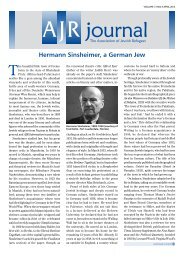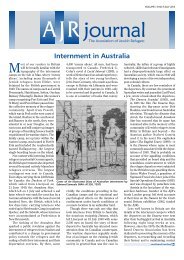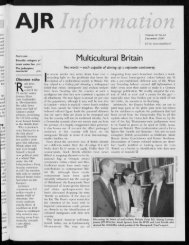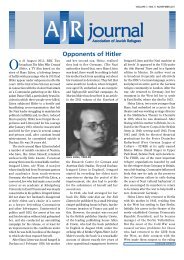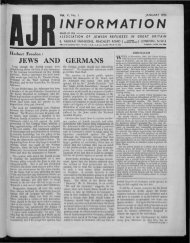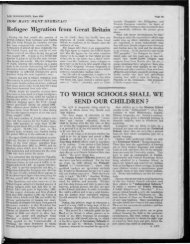INFORMATION - The Association of Jewish Refugees
INFORMATION - The Association of Jewish Refugees
INFORMATION - The Association of Jewish Refugees
You also want an ePaper? Increase the reach of your titles
YUMPU automatically turns print PDFs into web optimized ePapers that Google loves.
Page 6<br />
Hans Jaeger<br />
TWENTY-FIVE YEARS AFTER<br />
<strong>The</strong> German Resistance Movement<br />
As the 25th anniversary <strong>of</strong> July 20, 1944,<br />
draws nearer, new books on the German resistance<br />
movement appear on the market. Some<br />
<strong>of</strong> them do not deal with the problem as a<br />
whole, but with individuals such as Bonhoeffer,<br />
Goerdeler and others. And now, with the publication<br />
<strong>of</strong> Christopher Sykes's book*, it is<br />
Adam v. Trott zu Solz, almost at the same time<br />
as Diana Hopkinson's, " <strong>The</strong> Incense Tree"<br />
(Routledge & Kegan Paul, London)** which<br />
shows Trott through the eyes <strong>of</strong> an English<br />
Jewess who felt attracted to him yet resented<br />
some <strong>of</strong> his features. <strong>The</strong> book is as exciting as<br />
a novel, but is, at the same time, a work <strong>of</strong><br />
scholarship. It deserves praise for various<br />
reasons. <strong>The</strong> author does not set out to<br />
" prove" anything, nor does he indulge in<br />
effusive glorification in the old-fashioned style<br />
<strong>of</strong> hero worship and personality cult. He<br />
depicts a human being, with all his inadequacies<br />
and shortcomings. He seeks to explore<br />
the tmth. He is cautious in his judgement,<br />
balanced, careful, precise and conscientious,<br />
as one expects from a reliable historian.<br />
Conflicting Feelings<br />
And yet the book revives a clash <strong>of</strong> conflicting<br />
feelings. It is hard indeed to strike a<br />
happy medium between an uncritical apotheosis<br />
and unfair depreciation <strong>of</strong> German<br />
resistance. Hostile sceptics maintain that<br />
the resistance fighters only appeared on the<br />
scene when the war was lost; this is quite<br />
untrue. On the other hand such prejudices<br />
cannot be overcome by the assessments during<br />
the first post-war years, which gave the impression<br />
that the Nazis were only a tiny minority.<br />
References to the fact that the majority <strong>of</strong><br />
the nation stood behind the regime, especially<br />
at the time <strong>of</strong> success, and that a dictatorship<br />
can only be overthrown if the majority is<br />
against it, were countered with the angry<br />
statement that people subjected to constant<br />
oppression had no choice, and that those who<br />
were in safety abroad had no right to<br />
criticise.<br />
In the course <strong>of</strong> time, some facts have<br />
become clearer. <strong>The</strong> resistance movement was<br />
very small, and it was by no means homogeneous.<br />
<strong>The</strong>refore, the assumption that it<br />
was a united force is false. It comprised a<br />
spectram from former Nazis via Conservatives,<br />
Liberals, religious circles, up to Social Democrats<br />
and Communists.<br />
All these considerations come to life again<br />
when one reads Sykes's book. <strong>The</strong> father <strong>of</strong><br />
Adam v. Trott zu Solz was a former Prussian<br />
Mimster <strong>of</strong> Culture whom many will still<br />
remember ; he resigned at a later stage <strong>of</strong> the<br />
First World War, when the German Emperor,<br />
under pressure from the masses, promised<br />
to abolish the infamous three classes electoral<br />
system. Adam's mother was the daughter <strong>of</strong><br />
a Silesian aristocrat and an American woman<br />
whose great-grandfather was a friend <strong>of</strong><br />
Washington. Thus Prussian and Anglo-Saxon<br />
Puritanism combined. Adam v. Trott's education<br />
was designed in the strict authoritarian<br />
system <strong>of</strong> that time. According to the character<br />
<strong>of</strong> an adolescent, this may result in total submission<br />
or total rebellion. In the case <strong>of</strong><br />
Adam it produced a complicated mixture<br />
* Chrlstoper Sykes : Troubled Loyalty. A Biography <strong>of</strong><br />
Adam v. Trott. Collins, London. 477 pp. 453.<br />
** Reviewed on the opposite page<br />
because he was a rebel and yet could neither<br />
jump over his own shadow nor disregard his<br />
origin and upbringing. His father, who died<br />
in 1938, remained reserved towards the Nazis.<br />
His mother developed a growing indignation<br />
against the system, especially against the<br />
" deification <strong>of</strong> the racial idea ".<br />
Adam's elder brother, Wemer, " went along<br />
with the Communist party ". Not wishing to be<br />
a " parlour pink " he took up work in a factory<br />
(though this was certainly not expected <strong>of</strong><br />
him by the party). Later, his Communism must<br />
have faded out, as he was a religious man<br />
and, in 1942, he converted to Catholicism. He<br />
obstructed the regime in his way, but he did<br />
not join the resistance movement and he disapproved<br />
<strong>of</strong> Adam's tactics <strong>of</strong> camouflaging<br />
his activities against the regime by joining the<br />
N.S.D.A.P. (though rather late) and entering<br />
the service <strong>of</strong> the Foreign Ministry. In his<br />
view this was bound to be infectious and meant<br />
compromising with the " Devil" (in whose<br />
existence he believed). After Adam's execution,<br />
the grudge that Adam had not taken him<br />
into his confidence about the conspiracy was<br />
almost stronger than the grief about his tragic<br />
fate.<br />
Under Werner's influence Adam was preoccupied<br />
with Socialism, but never became a<br />
Communist. Tradition was much too strong in<br />
him. In his later memoranda he even strongly<br />
used the argument <strong>of</strong> the " Communist<br />
danger", and this cannot have been tactics<br />
or camouflage only. His alleged talk with<br />
Alexandra Kollontay, Soviet Ambassador to<br />
Stockholm during the war, is recorded by<br />
Sykes only as a rumour which might be attributed<br />
to a mix-up. It was Allen Dulles who<br />
in " Germany's Underground" asserted it as<br />
a fact and thus contributed to the notion still<br />
current that Trott belonged to the extreme left<br />
and wanted a settlement with the Russians.<br />
PELTOURS<br />
World Wide Travel Agents<br />
for<br />
Business and Pleasure<br />
We h ave movei d to<br />
72 Wigmore Street<br />
London W.l<br />
'phc<br />
01-935 5500<br />
AJR <strong>INFORMATION</strong> July, 1969<br />
Certain writers had an interest in casting this<br />
allegation as a slur on other resistance fighters,<br />
including even Stauffenberg.<br />
Anyhow, according to Sykes, he first became<br />
a " Leftist". He horrified his father by the<br />
confession that he would vote for the S.P.D.<br />
Later he called himself a Liberal, and on<br />
various occasions he spoke in favour <strong>of</strong> the<br />
idea <strong>of</strong> a " Conservative revolution " (in itself<br />
a rather ambiguous conception, sometimes<br />
competing with National Socialism, sometimes<br />
running parallel, sometimes crossing lines,<br />
sometimes even ending up in the national<br />
revolution). This was a rather far cry from<br />
his study <strong>of</strong> Marx, though not necessarily from<br />
his occupation with Hegel. If Adam needed so<br />
long to mature, it was because he was basically<br />
a romantic. He was emotional, spontaneous,<br />
impatient.<br />
In his early days he was shocked by antisemitism,<br />
which he first noticed in Bavaria<br />
(he must have lived in an ivory tower whilst<br />
he resided in Northern Hesse). But, in other<br />
respects, he paid tribute to the traditions <strong>of</strong><br />
his caste. He enjoyed membership in a corps<br />
and says about it: " Blood flowed in streams.<br />
I did not faint in spite <strong>of</strong> taking part in all<br />
the bouts <strong>of</strong> my corps ". Besides, he was very<br />
class-conscious (contrary to his brother).<br />
When, already under the Nazis, he ha(J to<br />
defend a Communist, Siebert, in court, he<br />
tried to convert him, telling him that a new<br />
Germany must be guided " by the traditional<br />
leaders ". " We have centuries <strong>of</strong> experience<br />
in leadership, and it would be folly not to use<br />
them ". He was convinced that only the nobility<br />
could overthrow Hitler. This is an important<br />
point. <strong>The</strong> nobility, which via Hindenburg,<br />
Papen and the German Nationals, had helped<br />
Hitler to power after the conference in<br />
Schroeder's villa in January, 1933, atoned at<br />
least partly in the resistance movement, to<br />
which they contributed by a strong contingent.<br />
But was this not also one <strong>of</strong> the reasons for<br />
its failure, since it was removed from the<br />
masses ? This, <strong>of</strong> course, does not diminish<br />
the nobility <strong>of</strong> attitude, the courage, the<br />
sacrifice.<br />
Conservative Nationalism<br />
Another point which comes in is nationalism.<br />
It was the element which tied some Conservatives<br />
to the regime and made them condone<br />
the sinister aspects. Others broke away,<br />
appalled by the atrocities, but their nationalism<br />
came in all the same in various ways.<br />
When Trott was in England in 1934, he wrote<br />
a letter to the " Manchester Guardian" in<br />
which he protested against the statement that<br />
German courts were an instrument <strong>of</strong> antisemitic<br />
persecution. Even storm-troopers, he<br />
wrote, would never feel justified in executing<br />
the race doctrine with methods <strong>of</strong> violence !<br />
This attitude was coupled with constant attacks<br />
on England, which he loved at the same time.<br />
He quarrelled with his friends, considering<br />
himself as a " representative" <strong>of</strong> Germany<br />
when he was abroad, and believing in his mission.<br />
His problem was how far can one as a<br />
patriot collaborate with a regime <strong>of</strong> which<br />
one disapproves. <strong>The</strong> line <strong>of</strong> his negotiations<br />
was that if the Germans overthrew Hitler,<br />
concessions would have to be made to them.<br />
He made conditions, demanding the abandonment<br />
<strong>of</strong> the " unconditional surrender " idea.<br />
He infuriated Judge Frankfurter in the U.S.<br />
Some American circles even thought he was a<br />
subtle German agent. Of course, he was not.<br />
In Britain, distrust was growing too, although<br />
Cripps, Crossman and others retained their<br />
confidence in him. But the line he took in<br />
his negotiations abroad was bound to fail.<br />
Insisting on annexations was a grim mistake<br />
<strong>of</strong> the Resistance.<br />
Continued on next page, column 1<br />
i



